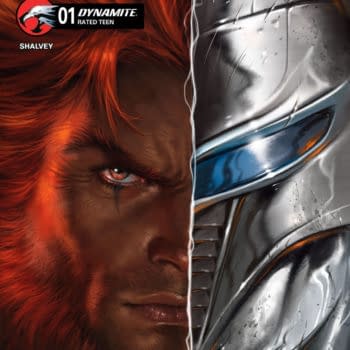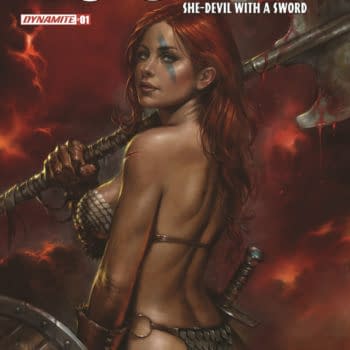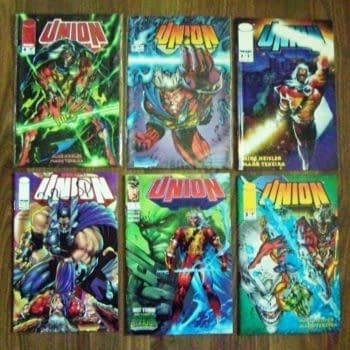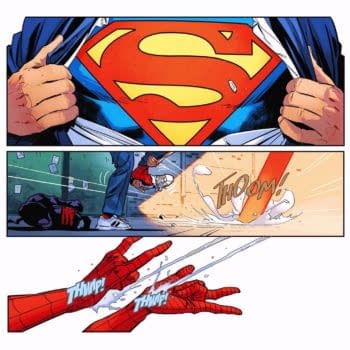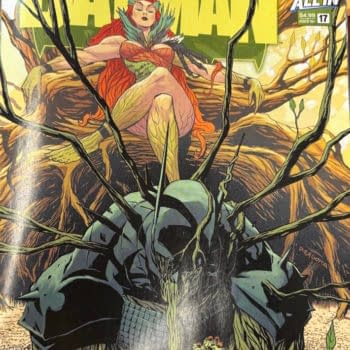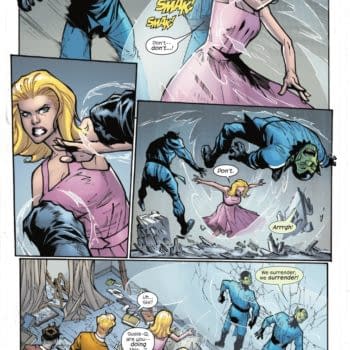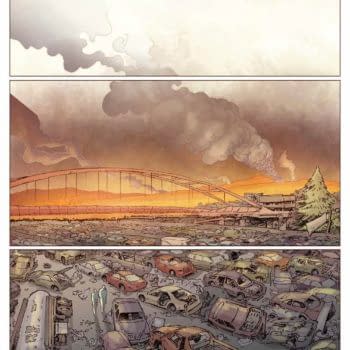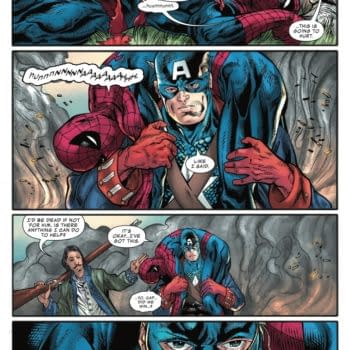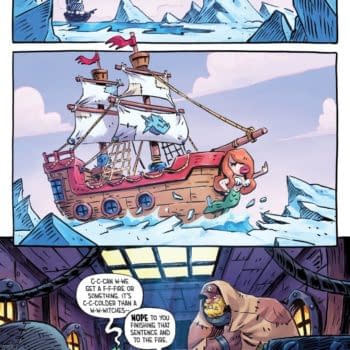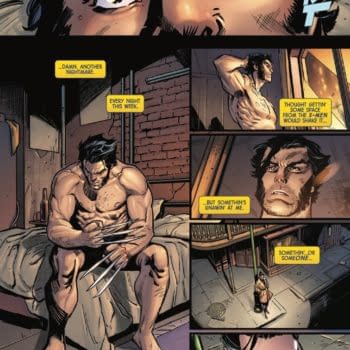Posted in: Comics | Tagged: comic sales, Comics
The End Of The Comics World Is Nigh
New York Post writer Reed Tucker is on a mission to explain what's wrong with the comics industry.
Did you miss the good news? According to ComiChron, comic book sales in 2012 were at their highest level in two decades. It was a good year, with funnybook publishing raking in some $715 million. Add that to the other mainstream media stories popping up (regrettably with a headline containing the word "Biff!") about the rebounding market and the superhero's growing presence in mainstream culture, and geeks should be popping the bubbly.
So why doesn't it feel like a time to celebrate? Why does it feel like it's one of the worst eras to be a reader since the days of The Clone Saga — at least when it comes to the big-two titles? Inflated prices, desperate reboots, an even greater flood of tie-ins, crossovers and other publishing gimmicks have become the order of the day.
Overall sales may be getting better (though when you take into account inflation, that's debatable), but in the end, it hardly matters. Comic books long ago became a niche hobby reaching few outside the circle of hardcore Wednesday crowd. The frustrating thing is, DC and Marvel seem to have thrown in the towel on this point, and most everything they publish has become in service of that ever-narrowing crowd.
In Business 101, you learn that there are really only two ways to make more money as a company: You can sell to new customers, or you can squeeze more money from your existing customers. Increasing ARPU, they call it: average revenue per user.
The publishers (Marvel more-so than DC) seem to have decided that broadening the audience just ain't gonna happen, so they've opted for the latter, raising prices and gambling that their current customers will shell out more money each month for an ever-expanding line of branded books or for big events that promise to break the Internet in half.
Do you like Batman? Well, you're gonna love him in 13 other monthly books. Or, were you moved when that one character actually died back in the 1980s? Well, we've got a boatload of shocking new deaths for characters that will definitely not be resurrected in six months with some plot fudge involving a time gun.
So far the strategy seems to have worked, in that it has helped the publishing market rebound slightly and allowed the big-two publishers to pump up their bottom lines. But these are most likely only short-term gains. This is not the way to build an audience for the long-term, and this is certainly not the way to ensure that comic books exist as anything other than a niche hobby.
Sales are supposedly up, but anecdotally, it sure seems like a lot of long-time readers are fleeing the pastime. "I love me some comics, but I finally had to quit this addiction," wrote one commenter recently on Ain't It Cool News, whose opinion was quickly echoed by others.
Now is the time to fix it, lest it goes the way or the dodo or the pet rock. A few decades from now, a kid will find a dusty copy of The Weird #3 in grandpa's attic and wonder what the hell it is.
If someone were to put me in charge of DC or Marvel for one day – Anyone? Anyone? – here's what I'd do.
Stop putting out so many freakin' titles
It may seem antithetical that cutting back on something might help it grow, but occasionally it's true. Hell, it works with hair and it works with bonsai trees. It's time for DC and Marvel to drastically slash their lines. It might actually increase sales.
DC has been flogging its "New 52," (in reality, the company publishes even more than that bloated number), and as best as anyone can tell, the strategy behind 52 didn't arise out of any data about what the market will bear or which characters can carry a title, but instead grew out of the number of weeks in a year. They may as well have based their entire publishing strategy on the cycles of the moon.
And 52 monthly titles have obviously proved too many. After Batman, Superman, Green Lantern, Wonder Woman and the other recognizable marquee characters, DC was left scrambling to fill the racks with unknowns like Mister Terrific and Voodoo, just to reach this rigid, nonsensical 52 threshold that they set for themselves. Not surprisingly, a good number of the initial launch titles have been cancelled – though only to be replaced by new ones, so that the 52 brand can be kept intact.
It doesn't make any sense.
I'd cut the number of titles by more than half. Completely pare down the line to only its most recognizable and bestselling titles. Sorry, OMAC. I don't care if the co-publisher is writing you. You would never have been greenlit in the first place. Sorry, 15 confusing iterations of the X-Men. There will now be two books with X in the title, tops.
One of the things that both DC and Marvel are selling is the shared universe concept, the idea that these adventures and characters all inhabit the same place. Something that happens in one title has a ripple effect to another. With fewer titles, readers would be a lot more likely to follow a greater number of books as the universe begins to feel a lot less sprawling and more manageable. Readers would invest more in the stories. Too many titles only leads to confusion and encourages readers to check out.
Look at old Marvel subscription ads from the early 1980s, and you'll find almost no offerings beyond simply-named titles featuring recognizable characters (except for US 1, whatever that was), as well as a few licensed titles. Amazing Spider-Man, Thor, The Incredible Hulk. Is it a coincidence that the massive expansion of the X-Men line coincided with the greed-drenched speculator boom of the 1990s? Prior to that, if you wanted a title with X in it, there was Uncanny X-Men.¤.¤.and that was about it.
A smaller line will force more readers to invest in those few series, as opposed to spreading their money out broad line of titles. Instead of having 30,000 people buying, say, four different X-Men books, wouldn't it be better to have 120,000 people buying one X-Men book?
Imagine if Marvel only published 5 titles. How many Marvel zombies would buy them all? What about ten titles? Fifteen? At some point the line of titles gets too broad for fans to pick up every one, but the fewer the titles, the greater the likelihood that readers will buy more of them.
The glut of titles also turns off new readers. Say that you discovered the Avengers or Batman or the X-Men at the movies and wanted to follow their printed adventures. Walking into the comic book shop might send you running the other way. There's just too much material, too many titles and too many numbered and renumbered volumes for newbies to make any sense of.
It's no wonder that the massive success of movies, such as Spider-Man and The Avengers, hasn't led to any negligible bump in sales. What would a converted fan buy to start with? Would he even be able to understand what he was reading?
Now look at the Walking Dead. The TV series has actually led to a huge increase in sales of the comic. Issue #100 was the top seller in 2012, and its trade volumes consistently clog the bestseller list. Not bad for a title whose first issue had an initial print run of about 7,000. And you gotta figure that the Walking Dead comic book has been able to capture some of the TV audience because it's easy to understand and buy. There's only one title, one set of trade paperbacks. (It also helps that it's really good.) Robert Kirkman has resisted the temptation to spin out a companion title or mini-series. Want to start at the beginning of the story? Look for the number 1. That's it.
Simplify, consolidate.
Of course, the publishers will argue that slashing titles will cost them money. That might be true initially, but as the months went by, die-hard fans would probably be apt to pick up more titles when faced with fewer choices. They're addicts who need their fix and they're gonna get it any way they can.
But let's look at the math. DC, for example, shipped around 2.4 million comics in February 2013 for about $8.4 million in sales. And the company had to publish about 70 titles to get there.
Let's say the company only published 20 titles. That's it. To reach their current sales mark of 2.4 million units, each title would have to sell 120,000 copies. Moving that many units doesn't seem feasible and it may not be, but then again, the Justice League and Batman regularly sell around that mark – and that's on a monthly basis, without any crossovers or gimmicks.
Take a recognizable character, tell a great story with great art and the readers will come. What if every title in DC's stable had a creative team almost as capable and all-star as Batman and Justice League? No offense to J.T. Krul, but his name on the cover probably isn't packing them in. Fewer titles means you won't have to hire people like Krul or Scott Lobdell to write your books, leaving you with more marquee talent.
Stop charging so much
Yeah, yeah. Everyone's been complaining about this one for years, but with the jump from $2.99 to $3.99 and beyond, the industry seems to have reached a breaking point where it's actively losing readers because of the expense of staying in the hobby. Even longtime fans have been forced to now think about at an issue's cover price, and a lot of them have calculated it's just not worth it anymore.
I'd cut prices to $1.99.
Again, with lower prices, revenues might take a hit initially, but the companies have to ask themselves a simple question: Would you rather sell your product to fewer people at a higher price, or to more people at a lower price? The publishers have clearly opted for the first option, jacking up prices because they know that the most die-hard readers won't be scared off, no matter what kind of abuse is heaped on them. But how many new readers would a lower cover price bring in? How many current readers would be willing to take a chance on a new book or be slower to drop another one if the price was lower? Isn't selling 100,000 copies of something at $1.99 better than selling 50,000 copies at $3.99? In the end, the money earned is basically the same.
Here in New York City, one of the biggest restaurant trends is the $1 pizza slice shacks. These things are popping up on every corner, and it's a bit of a head-scratcher, because before they started appearing, the going rate for a slice was $2 and up across the board. These restaurants immediately cut the price of pizza in half, just like that. Did pizza suddenly become half as expensive to make? Nope. The owners just calculated that greater volume (as well as cheaper ingredients) would offset any money lost in the price cut, and so far, they seem to have been right.
Would the same principles work in comics?
Write for the digital marketplace
Of course, this talk of profits is where digital comes in. In the past, to keep books in print publishers have had to go through the expensive process of printing and warehousing books. As digital grows, that will obviously no longer be necessary.
The ideal situation for publishers will be to release issues in a monthly print format, then continue to make money on them forever – forever! — in the digital marketplace. It's like found money. DC and Marvel can sit on their butts and do nothing while the money fills the digital coffers. But the only way to do that is to produce work that people will want to continue to buy five or ten years down the road. DC and especially Marvel really aren't doing that right now. Instead, they're focusing on the big "event" stories and the shocking twists that are designed to keep the fanboys coming in every Wednesday, desperate to read what happens next.
But that's the strange thing about stories that "matter," to use the publishers' terminology. After a few months, they don't matter anymore. Twists are undone, genies are put back in the bottle, things return to the status quo, Spider-Man revealing his identity is magically wiped away. And that's a big problem for long-term sales prospects in digital. I wonder how many people are buying something like Siege: Embedded digitally months or years after its release?
The things that are going to sell best in digital format over the long haul are the things that currently sell best in trade paperback – timeless, well-crafted stories that are often self-contained. Watchmen, Walking Dead, Sandman. The Dark Knight Returns. Retailers move tens of thousands of those trade paperbacks year after year after year. Can the same be said for Dark Reign?
Publishers need to completely change their strategy. In the last decade, writers were ordered to "write for the trade." Now, writers should be nudged to "write for digital." Stories need be written to sell, not just on Wednesday, but years and decades from now. Plots shouldn't lean so heavily on continuity anymore. Books can no longer have the shelf life of milk. Twists and shocks are disposable. Good storytelling is forever.
Batman is currently following that strategy, so is Walking Dead and Hawkeye. If the companies make enough money from digital, maybe they can afford to lower the print cover prices. Perhaps the promise of digital requires paying less money to the talent upfront with the idea of more money on the back end over the long term.
In other words, the big two should start acting a little more like Image. The indie publisher has made tremendous gains over the last few years by focusing on quality material (much of it standalone) that is accessible to new readers, doesn't require encyclopedic knowledge of past events and can be enjoyed equally today or ten years from now.
The amount of money to be made off a continuity-contingent story that must be consumed in the month it's published (like Amazing Spider-Man #700, for example) is finite; the amount of money to be made off a story that can be read and enjoyed any time is infinite.
There's a reason why no one puts out soap operas on DVD. After the episode airs on TV, it becomes essentially worthless. It's completely disposable entertainment, only enjoyed during one 60-minute slot on one particular day. Too many comics, especially from Marvel, are similar. Like soaps, they only have one potential revenue stream: the money made immediately upon release. They don't have many prospects in the long-term trade or digital markets. Hawkeye recently became one of Marvel's very rare graphic novel bestsellers, debuting at #9. Most months, Marvel doesn't have any books in the top 20.
It's probably no coincidence that most of TV's soap operas have been cancelled. There's probably a lesson to be learned there.
Focus on established characters.
The big-two publishers at this point should take a hard, honest look at themselves in the mirror and realize what they are: caretakers of trademarked characters owned by big corporations. This isn't necessarily a bad thing. These characters have long histories and massive name recognition around the world, and there are plenty of creative types out there who'd cut off their penciling hand to work on them. That's the one major advantage DC and Marvel have over the other publishing houses, besides upfront money to talent.
There's no point in the publishing giants wasting time and energy trying to launch new characters and new-concept series at this point only to cancel them in six months. (Vibe, anyone?) That part of the market is now better served by Image and other boutique publishers. And what writer or artist, in the age of the creators' rights movement, wants to hand over a new character or concept that he won't own?
DC and Marvel should stop wasting time, money and manpower on stuff like Insurgent, which was cancelled mid-miniseries, and just focus on the characters they can slap on lunchboxes and pajama sets. This is the reality in 2013 under corporate ownership, and there's no shame in it.
There should be room for every kind of comic book in a healthy market, be it mainstream superhero, indie, standalone graphic novel or whatever. To get the market truly healthy is going to take some major moves by its biggest players and a realization that quick, monthly profits aren't the be-all and end-all. If there's one thing the comic book market should know about, it's coming back from the dead. The industry has faced more dire times than it's now facing, so here's hoping DC and Marvel will make smarter decisions going forward.
As Superman once said of Martian Manhunter when he died one of those times: "Pray for a resurrection."
I think he's wrong about every single point he makes. Still that's just my opinion… I'm off to the comments for that – Rich.







